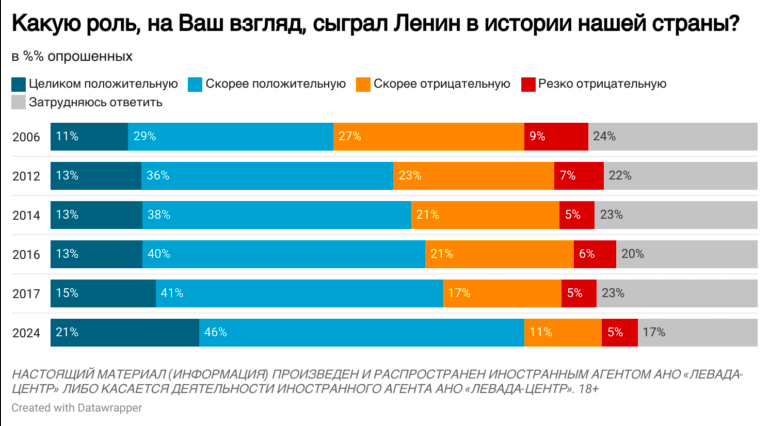
Published 05/07/2024 20:05
Sympathy for revolutionary leader Vladimir Lenin has reached its highest point in contemporary Russia since Soviet times, with an approval rating of 67%, reveals a poll conducted in April 2024. This increase in popularity reflects a trend in which only 16% of Russians have a negative attitude towards Lenin. This feeling is particularly strong among people over 55 and those under 24. Furthermore, the majority of Russians oppose the removal of Lenin’s body from the Mausoleum.
This wave of support for Lenin correlates with a growing preference for a planned economy, with 62% of respondents indicating a preference for this system over capitalism (24%). The Soviet system is considered the best by 49% of people interviewed, while only 18% prefer the current (capitalist) system, and 16% express a preference for Western democracy.
Since 2006, there has been an increase in the proportion of positive assessments of Lenin’s role in the country’s history – from 40% (in 2006) to 67% (in 2024) – today the majority of Russians believe that the revolutionary leader played a role positive in the country’s history (according to the sum of the responses, “totally positive” and “quite positive”).
As for those who “negatively” or “quite negatively” evaluate the role of the revolutionary, their number has now decreased from 27% and 9% to 11% and 5%, respectively. The drop more than doubled in the first case and almost doubled in the second, which is also very significant.
What role did Lenin play in the country? Strongly positive (dark), quite positive (light), quite negative (orange), strongly negative (red), can’t tell (gray)

Soviet Russia
This tilt toward socialism is evident in other areas as well. By the end of 2023, a record 48% of respondents expressed a desire to live under socialism, while just 5% preferred capitalism, according to a survey by the Institute for Social Research of the Russian Academy of Sciences.
Furthermore, the majority of respondents (80%) have a favorable view of the Soviet era, while 63% regret the dissolution of the Soviet Union. Half of those interviewed believe that the October Revolution had, in general, more positive consequences for Russia: “after the revolution, the country began to develop more”; “as a result of the October Revolution, Russia became a developed industrial power”; “Life has become better for ordinary people.” 21% of respondents believe there were more negative consequences for the economy.
However, not all Russians consider themselves socialists. Among young people, 28% identify as socialists, while another 20% consider themselves liberals and 13% are conservatives. Despite this, 73% of young Russians support state ownership, in contrast to just 17% who support private ownership.
When evaluating communism as a system of ideas, a form of social organization, most Russians believe that there is more good than bad in communism. However, in their argumentation, as a rule, people were guided by past experience. Among the positive aspects were social guarantees, stability, a fair society and order. Among the negatives are restrictions on freedoms, scarcity of goods and the suppression of individuality.
These trends reflect growing dissatisfaction with social inequality and economic stagnation in capitalist Russia. The dominance of the oligarchs and the confrontation with the West raised questions about the economic model adopted by the country, leading many to question whether the restoration of capitalism was truly beneficial to the interests of the Russian population.
Nostalgia for socialism
When people hear the words “Soviet Union”, they most often come to mind that it is about “childhood, adolescence, youth”, “all the best”, “a calm and confident life”. The overwhelming majority of people over 50 tell young people about life in Soviet times and, with rare exceptions, speak positively about it. People under 50, in turn, report that their ideas about the USSR are more influenced by the stories of their elders. And 82% of this age group listens to these stories.
The fact that youth are allied with their grandparents in their sympathy for the Revolution, according to poll analysts, reveals that the consciousness of those who are now between 18 and 24 years old is not so clearly clouded by the rampant anti-communist propaganda of the Yeltsin-Gaidar era – unlike those whose entry into adulthood occurred in the “bold 90s”.
In the current socio-economic conditions, young people are looking for answers to pressing social questions and, not finding them in today’s framework, they turn their attention to the Soviet heritage. And in this they are almost close to the age group of our fellow citizens who lived under socialism and preserved a grateful memory of that period in their souls. The searching youth and the convinced old age closed ranks today and formed a single Leninist bloc.
Com information de Equality.Media
Source: vermelho.org.br

